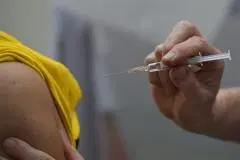
(Photo by Tobias Schwarz/AFP via Getty Image)
(CNSNews.com) – No country will match the United States when it comes to ensuring that a coronavirus vaccine, once available, is disseminated around the world, Secretary of State Mike Pompeo said on Wednesday.
“There is no nation that has been or will be as deeply committed to delivering vaccines all around the world as the United States of America – not just in terms of dollars,” Pompeo told reporters at the State Department.
“We will dwarf every nation in terms of the financial resources, the goodness of the American people, to give our money to make sure that these vaccines are delivered all around,” he said. “No nation will match us; it won’t even be close.”
Pompeo was responding to a question about the Trump administration’s decision not to join a global initiative, co-led by the World Health Organization (WHO), aimed at developing, manufacturing and distributing a vaccine for COVID-19.
According to WHO, more than 170 countries have entered an initial agreement to take part in the platform dubbed COVAX, which will pool investments in the search for a vaccine and then, once one or more are determined to be safe and effective, oversee a globally-coordinated rollout.
The goal of the initiative is to deliver at least two billion doses of safe, effective COVID-19 vaccines by the end of 2021.
COVAX is a joint project of the Global Vaccine Alliance (GAVI), and the Coalition for Epidemic Preparedness Innovations (CEPI), both public-private partnerships, and WHO.
It’s WHO’s leading involvement that lies behind the U.S. coolness to the initiative.
The U.S. has spearheaded criticism of WHO’s handling of the coronavirus outbreak that emerged in Wuhan late last year, with President Trump describing it as being under China’s sway.
In July the administration said WHO had refused to agree to make badly-needed reforms, and formally lodged notice to withdraw from the Geneva-based U.N. agency, a move due to take effect from next July.
Alluding to the continuing U.S. concerns about WHO, Pompeo said that when it comes to making vaccines available around the world, it was “imperative that when we do that, we need to do so in a way that’s effective, that’s not political, that is science-based.”
“And what we have seen demonstrated from the World Health Organization is that it is not that,” he added.
In similar vein, White House spokesman Judd Deere said in a statement on Tuesday, “The United States will continue to engage our international partners to ensure we defeat this virus, but we will not be constrained by multilateral organizations influenced by the corrupt World Health Organization and China.”
Race for a vaccine, and how will it be rolled out once available?
More than 860,000 deaths around the world have been attributed to COVID-19, with the largest numbers of deaths reported in the United States (more than 185,000), Brazil (more than 123,000), India (more than 66,000) and Mexico (more than 65,000).
As the race for a vaccine continues at an unprecedented speed, the WHO lists 176 experimental vaccines worldwide. Of those 33 are undergoing clinical evaluation, and eight have reached the “phase III” final stage of human trials (figures as of August 31).
In the U.S., three candidates supported by a multi-agency collaboration known as Operation Warp Speed are in phase III trials, and more are expected to reach that stage by the end of this month, according to Health and Human Services Secretary Alex Azar.
COVAX, meanwhile, has a portfolio of nine candidate vaccines in various stages of trials, including two in phase III – one in the U.S. (Moderna Inc.) and one in Britain (Oxford University/AstraZeneca).
Of the other seven, two are U.S., two are Chinese, one is German, one is Australian and one is a multi-country (France/U.S./Austria) project.
COVAX envisages vaccines being made equitably available to wealthier countries able to afford the vaccine, and lower-income countries which would be unable to do so without help.
WHO Director General Tedros Adhanom warned on August 24 that global competition for COVID-19 vaccine doses would result to price spikes and prolong the pandemic, “as only a small number of countries would get most of the supply.”
“Vaccine nationalism only helps the virus,” he said.
Under an allocation framework, the vaccine would first go to those at highest risk, including health workers, people over 65 years of age, and those with diseases that put them at higher risk of dying from COVID-19.
“As supply increases, the next stage of the vaccine rollout would be expanded based on an assessment of each country’s vulnerability to the virus,” Tedros said.
In the U.S., the National Academies of Science this week released a draft report for public discussion, on guidelines for allocating a vaccine once one is available.
In four recommended phases, vaccines would go to:
–high risk healthcare workers, first responders, those with conditions putting them at high risk, and older people in nursing homes;
–essential workers in critical sectors, teachers, school staff, older adults not already covered, and other groups including prisoners and prison staff;
–young adults and essential workers with higher risk who were not included in the earlier phases; and
–All remaining people living in the U.S.








